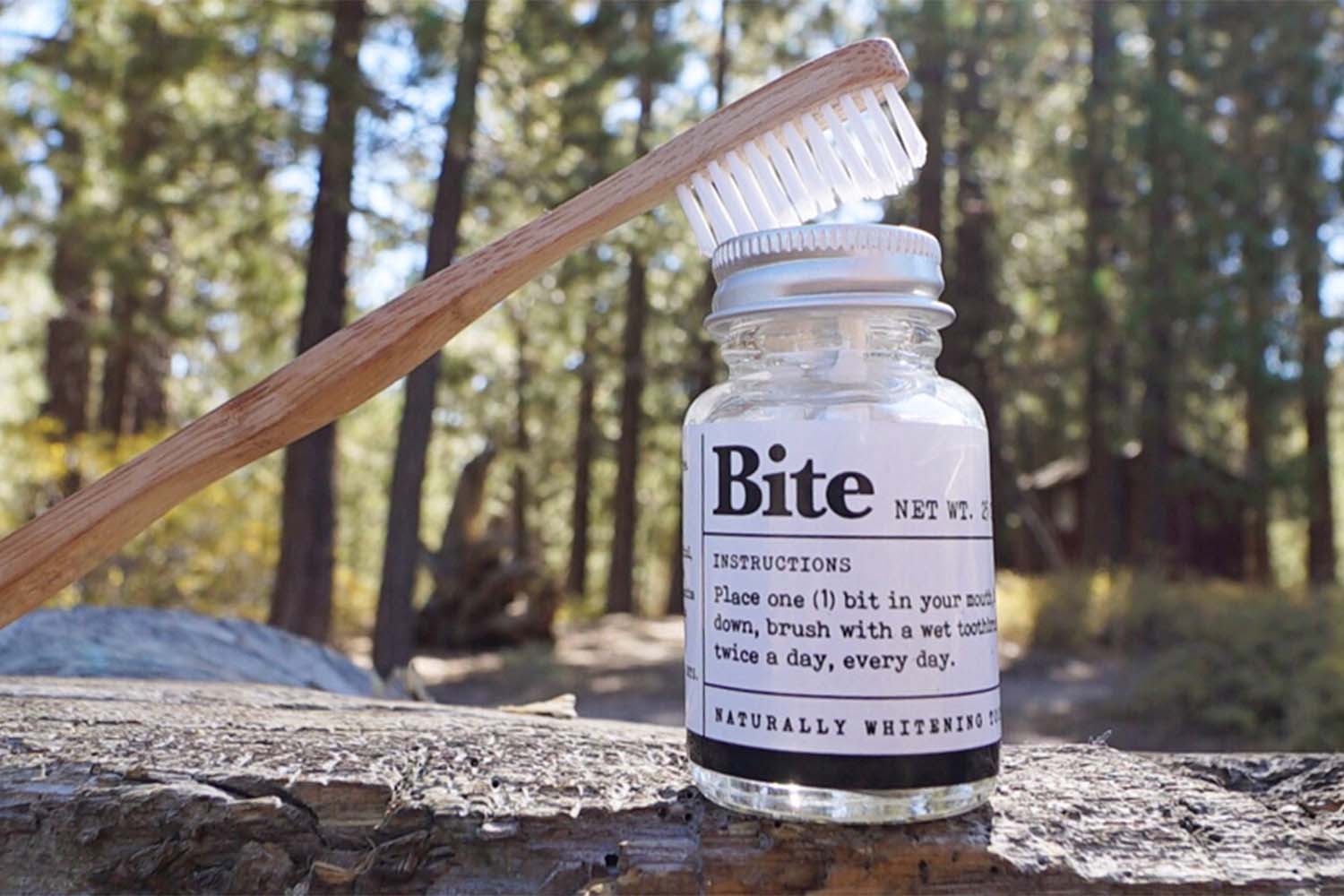Sustainable Habits: The Ones You'll Want To Follow in 2023
With sustainable practices trending and rising in popularity, there are so many simple ways that you can be more sustainable in your everyday life.
When you think of sustainability, you might think of those fun metal straws or having an abundance of mason jars in your cupboard, but there is so much more to sustainability than we think — though we aren’t complaining about these methods!
At Bite, we are proud to offer sustainable personal care products packaged and shipped using sustainable materials and methods. We believe personal care and environmental care should go hand in hand, and our non-toxic products can support both your wellbeing and our planet’s.
Here is a closer look into what sustainability entails and how you can incorporate it into your daily habits.
What Is Sustainability?
In simple words, sustainability is the practice of obtaining resources that benefit the environment, economy, and society without having negative consequences on the planet or future generations.
In the practice of sustainability, resources like water and electricity are conserved and used wisely. The goal of sustainability is to provide resources to keep the environment, the economy, and people healthy while also ensuring that future generations will be able to do so.
Why Is Sustainability Important?
Recycling your cans and using reusable bags at the grocery store may seem like mundane activities, but making small changes like these can significantly impact the health of the earth!
Building sustainable habits is important because they help improve our quality of life and the health of the ecosystems that provide us with vital resources. Sustainable habits help ensure that our future generations have a great quality of life — and that our planet remains habitable.
What Sustainable Habits Should I Follow?
You can follow many habits to be more sustainable, but it is important to choose habits that work for your lifestyle. Even the smallest changes, like reducing your water usage, can have a significant impact on the environment. Those changes add up!
Starting one sustainable habit and building from there is an achievable goal that the earth will thank you for.
1. Start Composting
Compostable materials are any organic material that, when broken down, can be added to soil to help plants grow. Some examples of compostable material include grass clippings, fruit scraps, vegetable skins, and even coffee grounds.
Different compostable materials contain different elements that can be very nutritious to plants. Brown materials contain carbon, green materials contain nitrogen, and the water in both materials helps break the compost down.
To start composting, all you have to do is put your compostable materials in a dry, shady area near a water source and cover the top of your compost area or bin.
Before long, you will have a natural fertilizer to use on your plants — and a great tool for reducing your waste!
2. Grow Your Own Produce
Speaking of composting, using compost to grow your own produce is a great sustainable habit to build, especially with the food shortages that have occurred due to the pandemic.
Growing your own fruits and veggies gives you complete control over where your food comes from and how it is grown. You can also make all-natural, eco-friendly pesticides to use on your produce and grow produce that is in season.
Growing your own produce reduces the number of trips you need to take to the grocery store and cuts down on grocery costs. You can even start a community garden so that everyone in your community has access to safe, fresh produce.
3. Use Reusable Grocery Bags
Globally, we use five trillion plastic bags on average per year. It takes up to 1000 years for a plastic bag to break down, and 10% of our overall plastic use ends up in our oceans, consumed by fish and other sea life that cannot digest it.
We can significantly reduce these numbers with reusable bags while also saving the precious ecosystems that we need to survive.
4. Try Reusable Food Wraps Instead of Plastic
If you enjoy cooking big meals, the chances are that you have leftovers stored in your fridge. While keeping and eating leftovers is a great way to reduce waste, the plastic containers and wraps we use to preserve them are not great.
Food wraps made from beeswax are washable and can be used again. Instead of plastic containers, try using glass containers or even those empty salsa and mason jars you may have in your home. Save money and save the planet!
5. Opt For Natural and Non-Toxic Products
Keeping yourself and your home clean and healthy is essential for overall good quality of life. This can be challenging, however, when most personal care and cleaning products are filled with harsh chemicals.
At Bite, we firmly believe that taking care of your body and the planet should work together. That is why our personal and oral care products are made without plastic — or toxic ingredients.
From toothpaste bits to deodorant, we are committed to giving you the products you need to care for yourself and the environment. Our products are free of harsh chemicals and cheap fillers and are full of clean, safe, and effective ingredients in sustainable packaging.
Learning about which chemicals to look out for and avoid on your product labels will help you make the choices that are good for your health and the earth’s health as well. At Bite, we steer clear of all parabens, phthalates, and sulfates.
6. Reduce Meat Consumption
Animal agriculture is responsible for an excessive amount of greenhouse gases, which are released into the atmosphere and contribute to climate change and air pollution.
Raising animals for meat requires large amounts of water, food, energy, and land, not to mention the inhumane treatment of these animals.
By reducing your meat consumption and replacing meat with plant-based protein, you can help reduce the demand for meat. Lower demand means lower supply, which can majorly reduce the amount of water, energy, and land consumed to raise animals.
Many grocery stores have great-tasting meat alternatives that taste exactly like some of your favorite meat products, like chicken nuggets and burgers. If you want to take a more straightforward approach, tofu is a classic and versatile plant-based protein.
7. Recycle
Recycling is a great sustainable habit to follow because it helps you reduce your waste and keep recyclable materials out of landfills and oceans.
To ensure that you are recycling properly, be sure to rinse out materials like cans and cartons and separate your materials so that they can easily be sifted through when they reach your local recycling plant.
At Bite, we use recyclable materials for packaging your oral care products, because small changes can add up to even bigger benefits for our planet. We think that is something to celebrate!
8. Use Less Water
Water is an essential resource that we use more than we think.
Treating and filtering water requires extensive energy. Building a habit of using less water can help reduce the amount of energy required to provide clean, safe water.
Small actions like turning the water off when brushing your teeth, using cold water for laundry, and taking shorter showers instead of baths can add up and greatly reduce your consumption and carbon footprint.
9. Be Mindful of Fast Fashion
Fast fashion is an inhumane industry that endangers the lives of many people — and contributes to environmental harm.
Fast fashion involves the quick turnover of fashion trends, meaning that the people who make these clothes have to produce copious amounts of clothing. These people are usually denied a secure, consistent wage, and even children are working these jobs.
Because these workers must make clothing quickly, the amount of resources being consumed to make this possible contributes to the dangerous release of greenhouse gases in our atmosphere. The fast fashion industry is responsible for up to ten percent of our total global carbon emissions.
Buying clothing from ethical brands or second-hand stores is a sustainable habit that will help you reduce your consumption. Shopping second-hand can also reduce the demand for clothes made with inhumane methods that destroy our planet.
Investing in high-quality staple pieces can also save you money in the long run. If you calculate the cost per wear of a cheaply made trendy top vs. a sustainable alternative, the latter will likely be much less per wear.
10. Use Public Transportation
Driving is a convenient way to travel, but most cars use gasoline, which produces the greenhouse gas carbon dioxide when burned.
Using public transportation like buses and taxis is a great way to reduce your car usage and carbon footprint.
11. Start Meal Prepping
Ordering takeout and going to restaurants are enjoyable (and delicious) activities. However, meal prepping at home is so helpful for reducing your waste and making the most of the food you already have.
Making large meals like soup, chili, and curry is great for meal prepping because you can easily portion these meals and store them in containers made with sustainable materials like glass.
Plus, you can experiment in your kitchen and create new and exciting recipes that you want to eat all week long.
12. Shop Small
Shopping small is a great sustainable habit because it helps support small businesses, especially ones that sustainably and ethically source their products. Many small businesses also sell hand-made products, which completely cuts out the need for industrial production.
The Bottom Line
Building sustainable habits can be difficult, especially when many everyday habits contribute to the destruction of the environment.
Trying one habit at a time and beginning habits that are feasible for your lifestyle still counts, and these small changes add up to big changes that help restore our ecosystems and earth back to health, one reusable bag and plastic-free product at a time.
Sources:
What is Sustainability? | UCLA
What is fast fashion and why is it a problem? | Ethical Consumer
Plastic Bags Used Per Year | The World Counts


